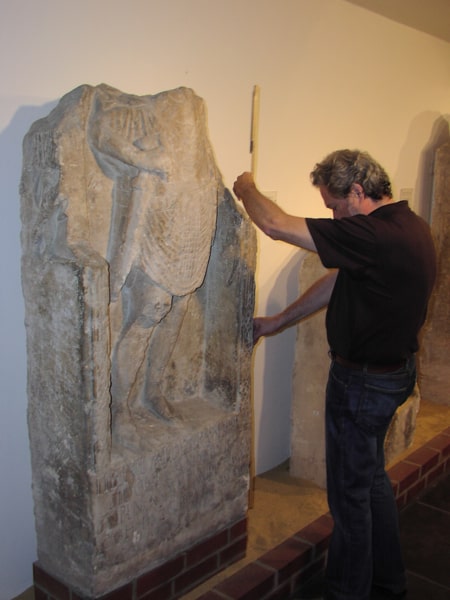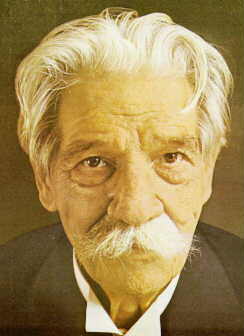Predictably one of the more controversial topics in my book The Jesus Dynasty is my discussion in chapter 3 titled “An Unnamed Father of Jesus?” in which I treat the “Jesus son of Pantera/Pantira” traditions. The topic has generated more than one sensational headline as well as lots of disdainful treatment, particularly from evangelical Christian readers and reviewers. As my colleague Prof. Ben Witherington dismissively phrased it in his four-part 28 page single-spaced Blog review of my book, “Tabor trots out for us the shop-worn tale of Mary being impregnated by a Roman soldier named Pantera” (Witherington on Tabor’s Jesus Dynasty)

The topic is as controversial as it is complex. My own position is that Jesus’ biological father remains unknown but is unlikely Joseph, husband of Mary. This puts me in an odd position of partial agreement with Christians who take the virgin conception/birth story literally and would likewise hold that Joseph was not the father of Jesus. In the book I then pose the sensitive question–if not Joseph then whom? Is there anything at all to be said of this matter? Has any alternative tradition regarding Jesus’ father come down to us? And the answer is yes, the name Pantera is found in a number of ancient sources. Rather than dismiss these out of hand as a “shop-worn tale” produced by Jewish opponents of the Christians who wanted to cast aspersions on Jesus’ paternity, I felt compelled to honestly examine what one might responsibly conclude about the subject. Having examined the “Jesus son of Pantera” textual traditions in their various forms I then turned to my own investigation of the tombstone of the 1st century Roman soldier, one “Tiberius Julius Abdes Pantera” from Sidon who was buried outside of present day Bingerbrück, Germany.
The earliest textual evidence comes from three sources:
1) We have two stories preserved in supplements to the Mishnah called the Tosefta (as well as in other parallel rabbinic texts but primarily see Tosefta Chullin 2:22-24) that refer to “Yeshu ben Pantera” (with alternate spelling variations). The first involves the famous Rabbi Eliezer ben Hyrcanus who lived in the late 1st and early 2nd century AD. Rabbi Eliezer relates a teaching in the “name of Yeshu ben Pantera” that he heard on the streets of Sepphoris from one Jacob of Kefar Sikhnin. Eliezer himself had been arrested for “heresy” and some have suspected he might have been sympathetic to the Nazarenes. The second story also involves Jacob of Kefar Sikhnin who attempts to heal a certain Rabbi Eleazar ben Dama of a snakebite in the name of “Yeshu ben Pantera.”
Although Maier and a few others have doubted these references are to Jesus of Nazareth, most experts are convinced that they are. Since both of these texts appear to use the designation “Yeshu ben Pantera” in a descriptive rather than a slanderous or polemical way they offer us evidence that Jesus was remembered as “son of Pantera” in the region of Galilee, and even on the streets of Sepphoris, in the early 2nd century. Indeed, Richard Bauckham argues quite persuasively that this Jacob of Kefar Sikhnin might well be James, son (or grandson?) of Jude the brother of Jesus, otherwise known to us as a prominent leader in the Galilean churches (Jude and the Relatives of Jesus, pp. 114-119).
2. The Greek philosopher Celsus relates in polemical work against the Christians preserved by the Christian theologian Origen that he had found it “written” that Jesus was the son of a Roman soldier named Pantera (Contra Celsum 1. 69). This text dates to the late 2nd century. Origen replies that the story was concocted by those who refused to believe that Jesus had no human father and was conceived by the Holy Spirit.
3. The 4th century Christian apologist Epiphanius seems to take the designation “Jesus son of Pantera” seriously in that he argues the name is actually a nickname for Jacob, the father of Joseph, husband of Mary. So rather than denying it is part of the family tradition he tries to explain it within that context.
If one begins to read through the literature on “Jesus son of Pantera” the most common explanation one finds is that “Pantera” is not the real name of any individual at all but a play on the Greek word “Parthenos,” or “virgin” that Jewish opponents of the Christians invented to make fun of their enemies. I am amazed at how many of my critics have referred to this idea as a way of dismissing the Pantera stories as references to a specific individual. This explanation is weak on two counts. First, linguistically, the Greek words pantera and parthenos are not even closely related in sound. But more important, none of the earliest sources quoted above, including Origen and Epiphanius, who both believed in the virgin birth, make use of this explanation. Epiphanius in particular recognizes that this is a “real” name and his only defense of it being associated with Jesus is to claim it was already “in the family” before Jesus’ birth. In that sense Jesus could loosely be called “Jesus son of Pantera.”
What Adolf Deissmann contributed to the discussion in his famous 1906 study on “Der Name Panthera” (see references in the notes to my chapter 3) was to remind us all that the Greek name “Pantera” was used by real individuals in the 1st century AD, and furthermore that it was particularly favored by Roman soldiers. He lists six examples which hardly makes the name common, but one of them is the Bingerbrück tombstone of Tiberius Julius Abdes Pantera, the 1st century archer who actually was from Sidon in Palestine. His point in his study is not to even remotely imply that this individual was the father of Jesus, but just that the tradition “Jesus son of Pantera” likely referred to some real individual rather than being a concocted term of Jewish polemical slander. The discovery of an ossuary with the name “Pentheros” in a Jewish 1st century tomb in Jerusalem by Clermont-Ganneau in 1891 has given us additional evidence that the name “Pantera” was in use in Palestine by Jews in the 1st century.
When I traveled to Germany in October, 2005 to examine the tombstone of Tiberius Julius Abdes Pantera of Sidon found in 1859 along with other Roman officers buried at Bingerbrück my intent was to find out all I could about these individuals. I do not hold the view that this particular individual was the father of Jesus. As far as I can tell that sort of definitive evidence simply does not exist. However I did come back with a thick file of evidence relating to the original excavation and its particulars that to my knowledge has never before been brought into the discussion. Pantera is only one of 10 other tombstones found at this grave site. I was able to photograph a painting that captures the original excavation of the site when it was accidentally discovered during construction of a railway station in 1859. Artifacts from the cemetery are also in various local museums in Germany, including coin and ceramic evidence. By studying the entire site we are in a much better position to say something about Tiberius Julius Abdes Pantera and his history. It seems to me those who have dismissed out of hand even the possibility that Pantera of Sidon might relate to the “Yeshua ben Pantera” stories would do well to examine more closely what can be known, and then to draw conclusions.
In a subsequent posts I will begin to cover some of what I have been able to ascertain so far in my research on this particular individual as I have continued my research in Germany over the past decade. It is not the case, as Prof. Witherington and others have asserted, that Pantera’s death at age 62 after 40 years of service in the army precludes him being old enough to have been the father of Jesus around the year 6 BC. Following that I also want to discuss the matter of the social and cultural implications of Mary becoming pregnant before her marriage to Joseph and how we might imagine such a possible scenario, given what we know, including what it might have meant to Jesus if he grew up not knowing his father.









Comments are closed.